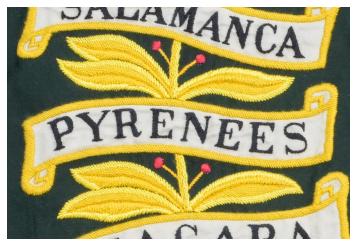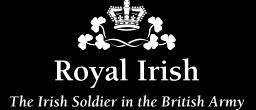Battle Honour 'PYRENEES'

|
The Battle Honour PYRENEES is emblazoned on the Regimental Colours of The Royal Irish Regiment. The Battle Honour was granted as a distinction to commemorate the hard fighting in the Pyrenees from 28 July – 1 August 1813.
In 1813 the three battalions of the 27th Inniskillings were on active service in the Peninsula. The 1/27th and 2/27th were in eastern Spain fighting with the army of the Anglo-Sicilian expedition protecting Wellington’s right flank. Only the 3/27th, or ‘Young Inniskillings’, would have the honour of driving the French beyond the Pyrenees. Following the French defeat at the Battle of Vittoria, Napoleon ordered Marshal Soult from Germany to take command of the French Army of Spain. The French held the besieged northern fortresses of Pamplona (commanded by Captain General Enrique José O'Donnell) and San Sebastian and also outnumbered Wellington’s force. Wellington brought forward reinforcements as Soult turned to attack his line of outposts covering the sieges.
During the fighting at Sorauren, just to the north-east of Pamplona, a battalion of the 10th Portuguese Regiment was broken by a French attack and Wellington's line was breached. He ordered the reserve up at the double and the Young Inniskillings, along with the 40th Regiment of Foot, were hurled 'against the crowded masses, rolling then backwards in disorder, and throwing them one after the other violently down the mountain side; and with no child's play for the two British regiments fell upon the enemy three separate times with the bayonet, and lost more than half their number.'
Wellington wrote in his despatches:
All the officers commanding, and the officers of the regiments, were remarkable for their gallantry.
The situation was restored and that evening, Soult ordered his cavalry and artillery back to France. Soult began his retreat on the evening of the 29 July and on 31 July the Young Inniskillings engaged the French rear-guard on the heights above the Lanz valley.
Wellington's total number of casualties for the Battle of the Pyrenees was some 4,000 and the 3/27th Inniskillings' casualties were 61 killed and 239 wounded.
Remember, remember Barossa -
Remember Napoleon’s chain -
Remember your own Saragossa,
And strike for the cause of Spain -
Remember your own Saragossa,
And onward, onward for Spain !
(Extract from ‘The Chains of Spain are Breaking’ by the Irish poet Charles Wolfe (1791-1823), whose best known poem is ‘The Burial of Sir John Moore after Corunna’, the latter described by Lord Byron as the finest ode in the English language.)





